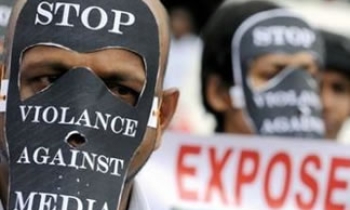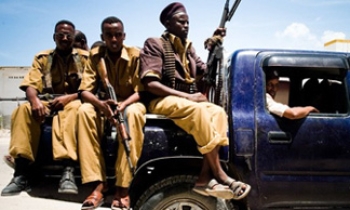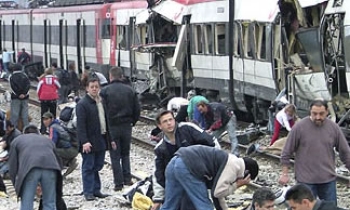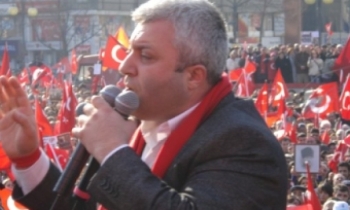Siham Mustafa sits behind a radio microphone and clutches a piece of paper. She is ready to fight. Earlier in the morning, al Qaeda in Iraq had hacked her radio station's Web site and posted a letter promising "to kill everyone from Radio Dijla."
It was the latest act of aggression against the renegade news and talk radio station that has overcome remarkable odds to remain one of the country's few independent voices. Mustafa, an announcer for 37 years, reads the station's prepared response. Then, she puts down the piece of paper and takes off her glasses. She pauses - dramatically - before launching into a spontaneous and soulful message.
"Iraq, you are in our hearts. Like the River Dijla, we will never stop!"
For the past 42 months, Radio Dijla, which is a transliteration of the Arabic word for the ancient Tigris River, has provided Iraqis with balanced reporting and a forum for varied opinions despite repeated threats and violent attacks by al Qaeda in Iraq and other extremist groups.
As Kareem Yousef, the station manager, puts it: "We have worked to open the minds of the people and let them freely express their thoughts. It's a humanitarian job because it allows people with different backgrounds and viewpoints to try to understand one another."
This mission has infuriated al Qaeda in Iraq. On May 3, about two dozen gunmen stormed the station's offices in western Baghdad. Staffers, armed with weapons they had stored on the second floor, fought off the attackers but not before a security guard was killed.
Assailants returned the following evening to loot and burn the building to the ground. Radio employees, refusing to abandon their work, posted coverage of the attack and its aftermath on the station's Web site within 48 hours. Nine days later, Radio Dijla was back on the air, broadcasting from a new home 225 miles northeast of Baghdad in Sulaymaniya, a city of nearly 1 million in the semiautonomous and more peaceful Kurdish region.
After hacking into the radio's Web site, al Qaeda in Iraq claimed responsibility for destroying the station's offices and issued a warning that they would kill the entire staff, according to Yousef.
Most Radio Dijla employees said it wasn't any one incident that sparked the attack. The overall consensus is that al Qaeda in Iraq simply couldn't tolerate an independent station that practices balanced reporting and refuses to defy the Iraqi government and U.S. military.
Ahmed Rikaby, who founded Radio Dijla in 2004 but now lives in the United Kingdom after repeated death threats, said the station's perseverance has "severely damaged al Qaeda's pride. They thought they brought us to an end after the attack in Baghdad, but we've grown even bigger since."
Indeed, the station continues to grow.
"We have more freedom and can operate 24 hours a day now, so we have even more listeners," said Yousef, the station manager. Since relocating to the Kurdish region, about 150 people a day have registered on the station's Web site, which counts more than 1 million hits monthly.
Increased protection and security are other reasons for the station's recent increase in listeners, station employees say.
In Baghdad, the Iraqi military didn't respond to Radio Dijla's pleas for help during the May attack until the assailants had left the scene, according to Yousef. By contrast, Kurdish armed forces known as peshmerga quickly secured the perimeter of the station's offices in Sulaymaniya on the same morning al Qaeda in Iraq hacked into its Web site.
The relative safety of northern Iraq is a major reason most of Radio Dijla's 55 employees made the trek. Their only regret is leaving the Iraqi capital. Yassen Rubai, 40, the station's news editor, said though he has six correspondents reporting throughout the country, including three in Baghdad, much of the news presented by Radio Dijla is gathered from satellite television and the Internet.
"Journalists want to see things firsthand," Rubai said, "but we can no longer operate in Baghdad."
According to Yousef, Radio Dijla changes its programming every four months. Besides its news shows, the station offers a variety of programming to its diverse audience. Recently Radio Dijla aired a cooking program called "Sinbad's Kitchen," featuring recipes for dishes from other Muslim countries. The program "First Review" offers critiques of the latest Arabic movies and allows listeners to share their opinions.
For an hour every Friday morning, Mustafa softens her persona to host the "Kids' Club," where the station's youngest fans phone their answers to questions on Iraqi trivia. And Amer Al-Waheed rants on all soccer-related topics during "Sports Hour."
The deadly strike in May against Radio Dijla, which was staged on World Press Freedom Day, was only one in a long line of violent assaults on Iraqi reporters. According to the New York-based Committee to Protect Journalists, at least 97 Iraqi journalists have been killed in the past 55 months.
Compared to what the station has endured in the past, the attack on its Web site, which occurred on Eid ul-Fitr marking the end of the Muslim holy month of Ramadan, was considered tame. Along with the threatening message, the flag of al Qaeda and a photo of Osama bin Laden appeared on the station's home page on Oct. 12. The source was traced to Saudi Arabia.
While Radio Dijla strives to maintain an impartial political and sectarian stance, staffers have decided to speak out against their attackers.
"I know they're listening," Hadi Mehdi, 40, who hosts a series of arts and entertainment shows, said of al Qaeda in Iraq before he went on the air. "I wish I could deliver my reply to them face-to-face."
In a show of passionate support, fans flooded Radio Dijla's phone lines on the morning al Qaeda in Iraq sabotaged its Web site. "May God save you," said a female listener who identified herself as Shayma. "We are with you - al Qaeda cannot stop you."
A random caller from Baghdad who referred to herself as the mother of a son named Ahmed said, "All of the people are with Radio Dijla because Radio Dijla is with all of Iraq."
Despite the continued risks, station employees are determined to continue working in the name of freedom of speech.
"No one will stop us," Yousef said. "This is the price of our success."









